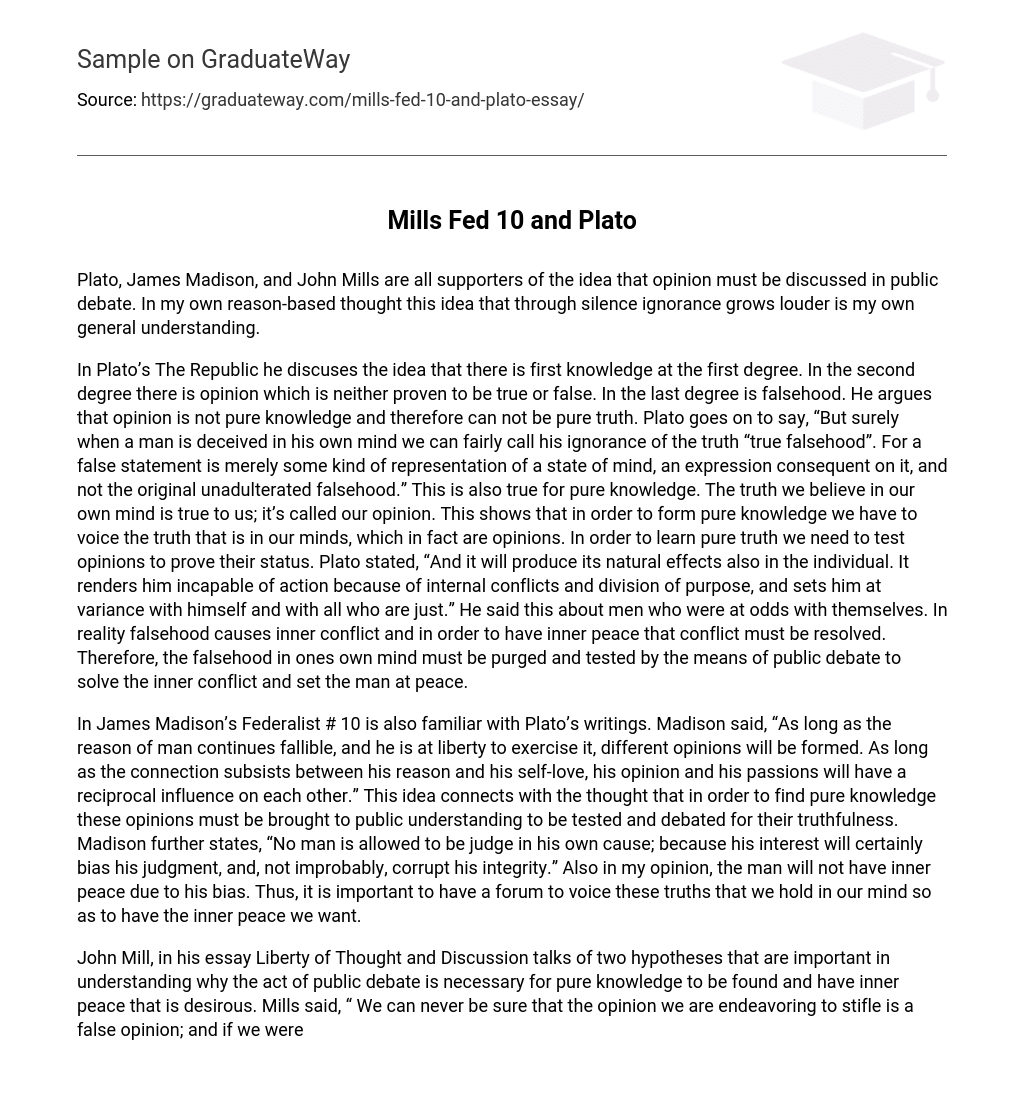Plato, James Madison, and John Mills all advocate for the importance of discussing opinions in public debate. In my own reasoning, I believe that if we remain silent, ignorance will become more pronounced.
In Plato’s The Republic, he discusses the concept of knowledge at different degrees. He argues that the first degree constitutes true knowledge, while the second degree is opinion, which cannot be proven true or false. The final degree is falsehood. According to Plato, opinion cannot be considered pure knowledge and, therefore, it cannot be pure truth either. Plato asserts that when someone is deceived in their own mind, their ignorance of the truth can be referred to as “true falsehood.” False statements are merely representations of a state of mind and not the original unadulterated falsehood. Similarly, pure knowledge is subjective and based on what we believe in our own minds – our opinions. To attain pure knowledge, we must voice the truths in our minds, which are essentially opinions. Testing these opinions is necessary to ascertain their veracity and establish pure truth. Plato maintains that individuals who experience inner conflicts and division of purpose as a result of being at odds with themselves are rendered incapable of action and are in conflict with those who are just. It is through resolving inner conflicts caused by falsehood that inner peace can be achieved. Therefore, one’s own false beliefs must be purged and tested through public debate to resolve inner conflicts and attain peace of mind.
In Federalist #10, James Madison acknowledges his familiarity with Plato’s writings and emphasizes the inevitability of differing opinions as long as humans are fallible and free to use their reason. He asserts that the reciprocal influence between one’s opinion and passions arises from the connection between their reason and self-love. To attain pure knowledge, these opinions must be subjected to public scrutiny and debate. Madison argues against individuals acting as judges in their own cause, since their self-interest can bias their judgment and undermine their integrity. From my perspective, such bias hinders one’s inner peace. Thus, having a platform to express these truths we hold in our minds is crucial for attaining the inner peace we desire.
In his essay “Liberty of Thought and Discussion,” John Mill discusses the importance of public debate in the pursuit of pure knowledge and inner peace. He presents two hypotheses that highlight the necessity of engaging in open discussion. According to Mills, stifling opinions, even if believed to be false, would still be detrimental. Additionally, he stresses the need for individuals to recognize their own fallibility and the possibility that their certainty in an opinion may be an example of their own error. These passages demonstrate Mills’ understanding of the crucial role public debate plays in proving or disproving true knowledge. By sharing one’s own truth with the public, Mills believes that dangerous outcomes can be avoided and falsehoods can be prevented from forming in one’s own mind. Ultimately, this approach elevates each individual to a higher level of understanding.
The text emphasizes the importance of fully exploring and accessing the truth within different opinions, while also acknowledging the risk of falsehoods. Mill argues that it is cowardly to withhold one’s own opinion, as this leads to self-deception. Opinions are seen as valuable sources of pure knowledge. However, without engaging in public debate to test these opinions, we cannot effectively separate true knowledge from falsehoods.





